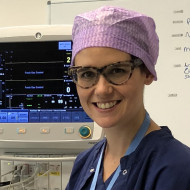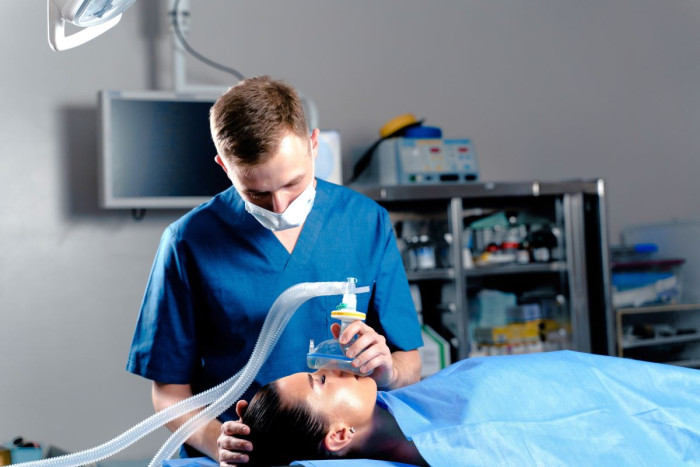Anaesthetist
Kairehu
Alternative titles for this job
Anaesthetists give anaesthesia (gas or injections to prevent pain) during surgery and other procedures. They assess patients and resuscitate them if necessary.
Pay
Anaesthetists usually earn
$206K-$247K per year
Anaesthetists can earn
$185K-$268K per year
Source: TEC research.
Job opportunities
Pay
Pay for anaesthetists and registrars (those in training) varies depending on seniority, hours, location and how often they provide on-call or emergency cover.
- Anaesthetists usually earn $206,000 to $247,000 per year.
- Anaesthetists can earn $185,000 to $268,000.
Source: TEC research.
(This information is a guide only. Find out more about the sources of our pay information)
What you will do
Anaesthetists may do some or all of the following:
- assess and treat patients before, during and after an operation, and plan their pain management
- talk to other medical specialists about patients' treatments
- decide on and administer anaesthesia (gas or injections to prevent pain) to patients
- monitor patients' vital signs (such as heart rate, blood pressure, temperature and breathing)
- resuscitate (revive) patients
- record details of drugs they give to patients
- teach medical staff and students about anaesthesia practice
- carry out research on new drugs and treatments.
Skills and knowledge
Anaesthetists need to have knowledge of:
- the effects of anaesthetics and other drugs on the body, and how to treat allergic reactions
- diagnoses, medicines and treatments, and the effect these can have on different patients
- different diseases and illnesses
- anatomy and how the human body works
- how to use specialised equipment to give and monitor anaesthetics
- medical ethics and law
- how to resuscitate (revive) patients
- new research, treatments and practices in their field.
Working conditions
Anaesthetists:
- usually work long and irregular hours, including on call, evenings, nights and weekends
- work in hospitals
- may travel nationally or internationally to attend conferences.
What's the job really like?

Courtney Thomas
Specialist Anaesthetist
Ko Ngāi Tahu me Te Arawa ōku iwi. Ko Courtney Thomas ahau.
Why did you decide to become an anaesthetist?
"I decided to pursue medicine, with the encouragement of my whānau, after watching my mother’s journey through the hospital system with a terminal illness. The idea of gaining entry to a respected profession where I might develop the skills necessary to help others in the way my mother and whānau had been helped, appealed to me.
"At first I was thinking about a career in surgery. However, after exposure to anaesthesia as a senior house officer and then as a registrar, I knew I had found my people.
"Anaesthetists stood out as understated, clever people. They need an intimate knowledge of applied science, along with practical skills to resuscitate critically unwell patients. They are communicators who reassure patients and manage team dynamics in the busy theatre environment.
"Their attention to detail and the intense commitment to each patient in their care provided both the challenge and reward I was after."
What are the pluses and minuses of becoming an anaesthetist?
"Getting through training is challenging, but so is anything in life that is rewarding and worthwhile.
"A career in anaesthesia has opened many doors, including travel, further study and a chance to meet some of the most humble yet expert and inspiring individuals I have ever known.
"As a young mum I now have a career that I love, and is flexible to the needs of my whānau. I wouldn't have it any other way!"
Entry requirements
You need more than one qualification to become an anaesthetist.
You need:
- to complete the Health Sciences First Year programme at the University of Otago OR the first year of either the Bachelor of Health Sciences or Bachelor of Science in Biomedical Science at the University of Auckland
- a Bachelor of Medicine and Bachelor of Surgery
- 2 years of general hospital experience after graduation
- 5 years of specialist training and to pass examinations to become a Fellow of the Australian and New Zealand College of Anaesthetists
- an Annual Practising Certificate
- to pass a police check.
You also need to be registered with the Medical Council of New Zealand.
- Vimeo website - NZ Society of Anaesthetists video on how to become an anaesthetist (Video - 1.15 minutes)
- University of Otago website - Health Sciences First Year programme
- University of Otago website - Bachelor of Medicine and Bachelor of Surgery
- University of Auckland website - Bachelor of Medicine and Bachelor of Surgery
- Australian and New Zealand College of Anaesthetists website - specialist anaesthetist training
The Vulnerable Children Act 2014 means that if you have certain serious convictions, you can’t be employed in a role where you are responsible for, or work alone with, children.
Secondary education
You need University Entrance to do the study or training for this job. Useful subjects include NCEA Level 3 biology, chemistry, maths, physics, English and te reo Māori.
Personal requirements
Anaesthetists need to be:
- accurate and careful, with an eye for detail
- able to work well under pressure
- good at communicating and inspiring confidence in others
- excellent at analysis and interpretation
- able to make good decisions, and solve problems
- aware of attitudes to medical treatment in different cultures
- able to work with other health care practitioners including nurses, surgeons, anaesthetic technicians and midwives.
Useful experience
Useful experience for anaesthetists includes:
- working with the Red Cross or St John's Ambulance
- working in hospitals or other health-related work.
Physical requirements
Anaesthetists need to have good eyesight (with or without corrective lenses) and good hand-eye co-ordination.
Registration
Anaesthetists need to be registered with the Medical Council of New Zealand.
Find out more about training
- Australian and New Zealand College of Anaesthetists
- (04) 499 1213 - www.anzca.edu.au
- Medical Council of New Zealand
- 0800 436 555 - www.mcnz.org.nz
- New Zealand Society of Anaesthetists
- 04 494 0124 - nzsa@anaesthesia.nz - https://anaesthesia.nz
What are the chances of getting a job?
Number of anaesthetists rising steadily
The number of anaesthetists is growing, with 1,020 anaesthetists registered in 2018 according to the Medical Council of New Zealand.
About 50 people graduate as anaesthetists each year.
Demand for anaesthetists growing
Anaesthetist appears on Immigration New Zealand's Green List. This means the Government is actively encouraging skilled anaesthetists from overseas to work in New Zealand.
Demand for anaesthetists is increasing due to:
- New Zealand's growing and ageing population, which means more demand for surgery and pain management
- new procedures, such as stroke clot removal, which require anaesthesia
- existing anaesthetists reaching retirement
- increasing numbers of anaesthetists wanting to work part time or job share
- some anaesthetist graduates leaving to work overseas
- a worldwide shortage of specialist doctors, including anaesthetists, which means it's hard to attract anaesthetists from overseas to work in New Zealand
Most anaesthetist vacancies not advertised
A number of anaesthetist vacancies are advertised through word of mouth, or only locally. This means your chances of securing a job are best if you contact hospitals directly.
Most anaesthetists work in public and private hospitals
Anaesthetists usually work for Te Whatu Ora in public hospitals. They may work on a casual basis in private hospitals.
A small number of anaesthetists work at Auckland and Otago university medical schools, as teachers and researchers.
Sources
- Australian and New Zealand College of Anaesthetists, 'New Zealand National Committee Annual Report for January 1, 2017 to December 31, 2017', accessed June 2019, (www.ansca.edu.au).
- Hagen, K, president, New Zealand Society of Anaesthetists, careers.govt.nz interview, February 2019.
- Immigration New Zealand, Green List, January 2023, (www.immigration.govt.nz).
- Macandrew, R, 'Blood Clot Removal Procedure Opens Up World of Stroke Research Possibilities', 18 October 2018, (www.stuff.co.nz).
- Medical Council of New Zealand, 'Annual Report 2018', 2018, (www.mcnz.org.nz).
- Woods, J, chair, New Zealand National Committee, Australian and New Zealand College of Anaesthetists, careers.govt.nz interview, February 2019.
(This information is a guide only. Find out more about the sources of our job opportunities information)
Progression and specialisations
Anaesthetists may progress to teach students and trainee anaesthetists at larger hospitals, or work in research and academic areas. They may also become senior consultants with responsibility for anaesthesia departments at hospitals.
Anaesthetists may specialise in areas such as:
- cardiac anaesthesia (during heart and lung surgery)
- obstetric anaesthesia (during childbirth)
- paediatric anaesthesia (for children)
- intensive care medicine
- pain medicine and related areas such as hyperbaric medicine (therapy that uses pure oxygen).
Last updated 13 December 2024


